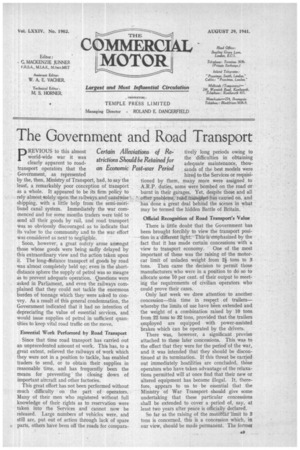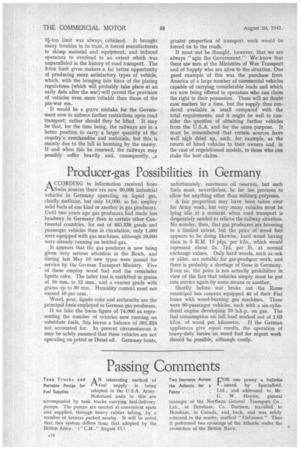The Government and Road Transport
Page 11

Page 12

If you've noticed an error in this article please click here to report it so we can fix it.
Certain Alleviations of Restrictions Should he Retained for an Economic Post-war Period pREMUS to this almost world-wide war it was clearly apparent to roadtransport operators that the Government, as represented by the, then, Ministry of Transport, had, to say the least, a remarkably poor conception of transport as a whole. It appeared to be its firm policy to rely almost solely upon the railways, and coastwiseshipping, with a little help from the semi-moribund canal system. Immediately the war commenced and for some months traders were told to send all their goods by rail, and road transport was so obviously discouraged as to indicate that its value to the conununity and to the war effort was considered as next to negligible.
Soon, however, a great outcry arose amongst those whose goods were being sadly delayed by this extraordinary view and the action taken upon it. The long-distance transport of goods by road was almost completely held up; even in the shortdistance sphere the supply of petrol was so meagre as to prevent adequate operation. Questions were asked in Parliament, and even the railways complained that they could not tackle the enormous burden of tonnage which they were asked to convey. As a result of this general condemnation, the Government indicated that it had no intention of depreciating the value of essential services, and would issue supplies of petrol in sufficient quantities to keep vital road traffic on the move.
Essential Work Performed by Road Transport Since that time road transport has carried out an unprecedented amount of work. This has, to a great extent, relieved the railways of work which they were not in a position to tackle, has enabled traders to send, or to obtain their supplies in reasonable time, and has frequently been the means for preventing the closing down of important aircraft and other factories.
This great effort has not been performed without much difficulty on the part of operators. Many of their men who registered without full knowledge of their rights as to reservation were taken into the Services and cannot now be released. Large numbers of vehicles were, and still are, put out of action through lack of spare parts, others have been off the roads for compara tivelj7 long periods owing to the difficulties in obtaining adequate maintenance, thousands of the best models were hired to the Services or requisi tioned by them, many more were assigned to A.R.P. duties, some were bombed on the road or burnt in their garages. Yet, despite these and all ' other problems; to,adtralis'Ort-l-la.s carried on, and has done a great deal behind the scenes in what may be termed the hidden Battle of Britain.
Official Recognition of Road Transport's Value There is little doubt that the Government has been brought forcibly to view the transport position in a'different light: This-is'emphasized by the fact that it has made certain concessions with a view to transport economy. One of the most important of these was the raising of the motorcar limit of unladen weight from 21 tons to 3 tons. Then came the decision to permit those manufacturers who were in a position to do so to allocate some 10 per cent. of their output to meeting the requirements of civilian operators who could prove their cases. Only last week we drew attention to another concession—this time in respect of trailers— whereby the limits of use have been extended and the weight of a combination raised by 10 tons from 22 tons to 32 tons, provided that the trailers rriployed are equipped with power-assisted brakes which can be operated by the drivers.
There was, however, a significant proviso attached to these later concessions. This was to the effect that they were for the period of the war, and it was intended that they should be discontinued at its termination. If this threat be carried out immediately hostilities are concluded, those operators who have taken advantage of the relaxations permitted will at once find that their new or altered equipment has become illegal. It, therefore, appears to us to be essential that the Ministry of War Transport should give some undertaking that these particular concessions shall be extended to cover a period of, say, at least two years after peace is officially declared.
So far as the raising of the moto-rc:ar limit to 3 tons is concerned, this is a concession which, in our view, should be made permanent. The former 2i-ton limit was always. criticized. It brought many troubles in its train, it forced manufacturers to skimp material and equipment, and induced operators to overload to an extent which was unparalleled in the history of road transport. The 3-ton limit gives makers a far better opportunity of producing more satisfactory types of vehicle, which, with the bringing into force of the plating regulations (which will probably take place at an early date after the war)-will permit the provision of vehicles even more 'reliable than those of the pre-war era.
It would be a grave mistake for the Government now to enforce further restrictions upon road transport; rather should they be lifted. It may be that, for the time being, the railways are in a better position to carry a larger quantity of the country's merchandise and materials, but this is mainly due to the lull in bombing by the enemy. If and when this be renewed, the railways may possibly suffer heavily and, consequently, .a greater proportion of transport work would be forced on to the roads.
It must not be thought, however, that we are always " agin the Government." We know that there are men at the Ministries of War Transport and of Supply who are alive to the situation. One good example of this was the purchase from America of a large number of commercial vehicles capable of carrying considerable loads and which are now being offered to operators who can claim the right to their possession. These will no doubt ease matters for a time, but the supply thus rendered available is small compared with the total requirements, and it might be well to consider the question of obtaining further vehicles from the U.S.A. and for the same purpose. It must be remembered that certain sources have well nigh dried up, such, for example, as the return of hired vehicles to their owners and, in the case of requisitioned models, to those who can stake the best claims.












































